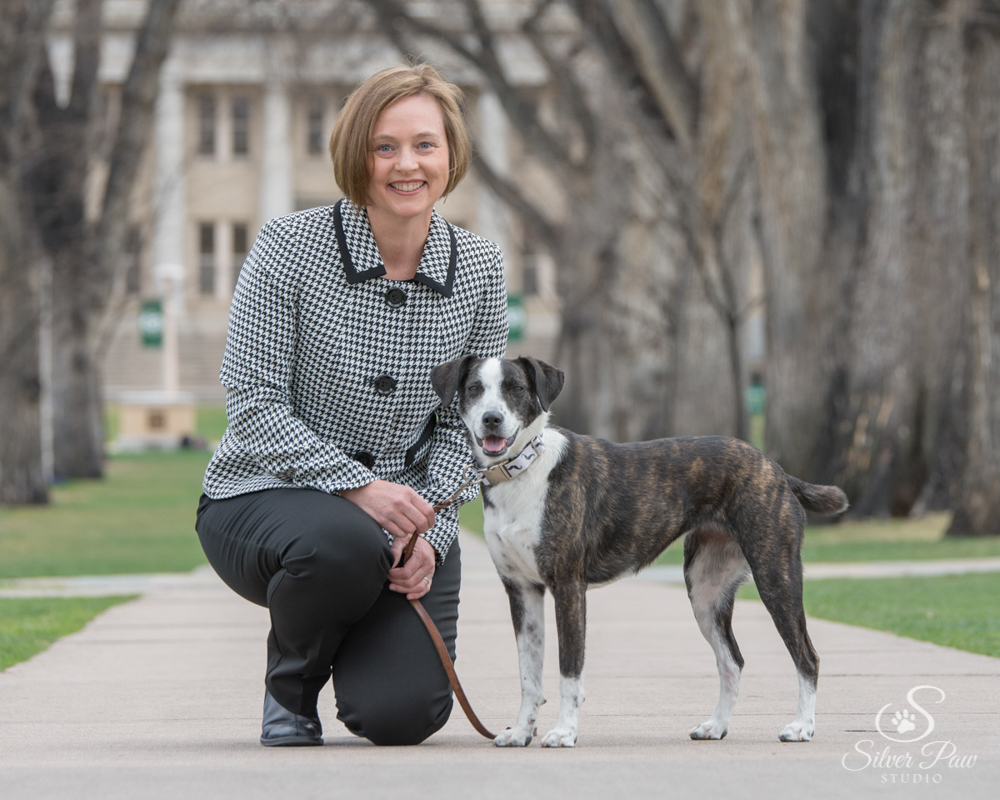Who hasn’t wondered where they will be in 5, 10, or 20 years? Since deciding to pursue her Master of Social Work degree at Colorado State University in order to study the human-animal bond, Helen Holmquist-Johnson (M.S.W. ’01, Ph.D. ’09) seems to have known exactly where she was — and is — going.
On April 1, Holmquist-Johnson stepped assuredly into her role as the new director of Human-Animal Bond in Colorado (HABIC). Known for its large network of more than 150 trained and certified human-animal volunteer teams, the human-animal therapy program provides services to roughly 800 people weekly.
“We have an opportunity to help create connections across the university and across the country,” Holmquist-Johnson said. “I’m eager to collaborate with fellow human-animal interaction scholars, practitioners, and students to expand the impact of the human-animal bond.”
Background in social work, human-animal bond
Holmquist-Johnson, who was recently selected through a national search, has an extensive background in both social work research and human-animal interaction. After completing her Master of Social Work, she earned her Ph.D. in Education and Human Resource Studies, with a specialization in Social Work.

During that time, Holmquist-Johnson also worked for the School of Social Work as a research associate, coordinating evaluation and research studies for large federal- and state-funded projects, and designing evaluations and implementation services in the areas of child maltreatment, mental health, and well-being. In 2012, Holmquist-Johnson became assistant director of the Social Work Research Center.
Holmquist-Johnson first become involved with HABIC in 1997. She completed her master’s thesis on the program, worked as a project coordinator, and served on many leadership committees. She has volunteered with three HABIC-certified dogs in school and long-term health-care settings. In addition, she teaches SOWK 550: Animal Assisted Therapy/Human-Animal Bond, a popular elective course in the social work program.
Goals: research and education
At HABIC, Holmquist-Johnson said the top priorities will be conducting much-needed interdisciplinary research in the field of human-animal interaction, and developing a graduate certificate program in the School of Social Work focused on theory and animal-assisted therapies.
“We need to strengthen the impact of animal-assisted interventions through research and education,” Holmquist-Johnson said, “to affirm and expand the value of the work our volunteer teams have been providing each week for nearly 25 years through community engagement.”
The School of Social Work recently received a gift of more than $1.6 million from the Avenir Foundation to support the growth and development of human-animal interaction and HABIC at CSU, including funding interdisciplinary research related to human-animal interaction, as well as a faculty position, a post-doctoral fellow, and a graduate research associate dedicated to the program.
HABIC’s mission is to improve the quality of life for people of all ages through the therapeutic use of companion animals. For more information about HABIC, visit www.habic.chhs.colostate.edu.
To support HABIC, go to advancing.colostate.edu/HABIC or contact Victoria Keller at Victoria.Keller@colostate.edu.
The HABIC program is part of the School of Social Work in CSU’s College of Health and Human Sciences.